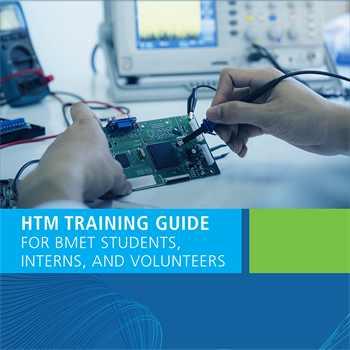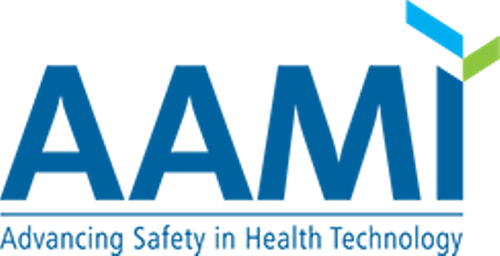New Guide Standardizes Healthcare Technology Management Training

For Immediate Release
Contact: Brian Stallard, bstallard@aami.org
Healthcare technology management (HTM) is a growing field brimming with opportunity. To keep pace with needs for new talent, the Association for the Advancement of Medical Instrumentation (AAMI) has developed a new guide for HTM departments looking to establish biomedical equipment technician (BMET) training programs or internships.
“This document is available in the nick of time,” said Danielle McGeary, vice president of HTM at AAMI. “While it is difficult to transition to start or alter a training program even at the best of times, COVID-19 has put many hospitals’ hands-on training, internship, and volunteer programs on hold. HTM leaders are making the best of this situation, using the pause to rethink their programs. Now, there’s a training guide to help these programs start up better than ever.”
The guide, HTM Training Guide for BMET Students, Interns, and Volunteers, is not a step-by-step manual for running an internship program. Instead, it is meant to give new and prospective HTM professionals, who are actively learning in the hospital, a broad overview of everything the profession entails. The guide comes with a ‘cheat sheet’ of common HTM acronyms and includes an extensive competency checklist, allowing managers to scale what their program will cover to fit the length of an internship or to accommodate for a trainee’s professional background. “We really wanted to create a baseline for what a good training program looks like,” said Samantha Jacques, vice chair of AAMI’s Healthcare Technology Leadership Committee (HTLC), which developed this resource, and vice president for clinical engineering at McLaren Health Care.
“We really wanted to create a baseline for what a good training program looks like,” said Samantha Jacques, vice chair of AAMI’s Healthcare Technology Leadership Committee (HTLC), which developed this resource, and vice president for clinical engineering at McLaren Health Care.
Together with Cory Brennan from Hall Render and Dean Skillicorn from Allina Health, Jacques gathered insights from all corners of the HTM landscape. The trio sought to ensure the guide can meet training needs for the majority of HTM departments.
“Of course, that was challenging,” Jacques explained. “We wanted this guide to not only be useful for any kind of HTM department training new staff, but also for students. They can look at the checklist and say, ‘now I know I’m proficient in this, but I haven’t even looked at that!’”
Being able to track what a prospective HTM professional has been trained in will be a boon for employers and job applicants alike. The HTLC envisions a future where standardized training allows applicants to provide clear documentation for showcasing the right skillsets. Similarly, employers will be able to onboard new employees efficiently, focusing on areas where training is still needed.
“We are facing an issue where, in the next 10 years, a large portion of HTM professionals is going to end up retiring,” said Jacques. “Succession planning and training are becoming a great focus for HTM leaders. We expect this training guide will become a valuable resource.”
Portions of the guide were derived from Core Competencies for the HTM Entry-level Technician and insights from AAMI’s Technology Management Council (TMC) subcommittee for creating a CBET apprenticeship program recognized by the U.S. Department of Labor.
“I was beyond pleased to see that this training guide builds on and aligns with the work that our team put in,” said TMC subcommittee lead Maggie Berkey, senior biomedical equipment technician at CommonSpirit Health.
Berkey already put some of these training guidelines to the test, launching a successful apprenticeship earlier this year.
The HTM Training Guide for BMET Students, Interns, and Volunteers is available for purchase in the AAMI store. It is free to all AAMI members and students (who are also eligible for a free AAMI membership).
About AAMI
AAMI (www.aami.org) is a nonprofit organization founded in 1967. It is a diverse community of more than 9,000 healthcare technology professionals united by one important mission—supporting the healthcare community in the development, management, and use of safe and effective health technology. AAMI is the primary source of consensus standards, both national and international, for the medical device industry, as well as practical information, support, and guidance for health technology and sterilization professionals.
Contacts
